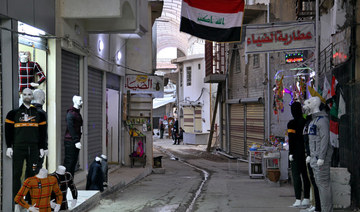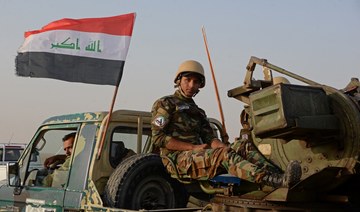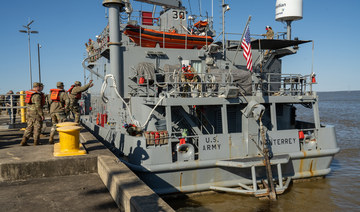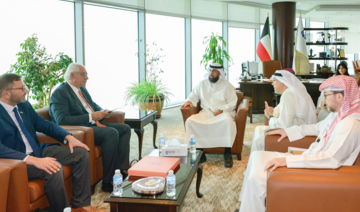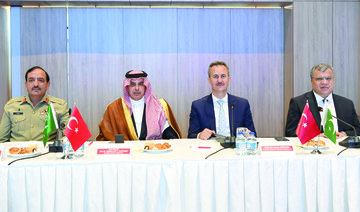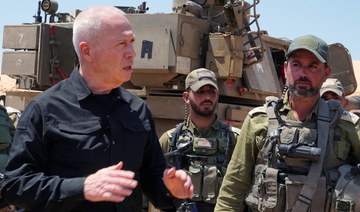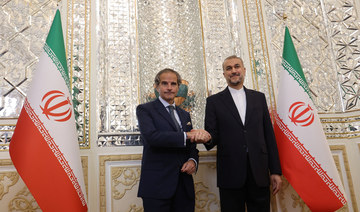BAGHDAD: The prime minister of Iraq’s northern Kurdish-run region on Wednesday blamed the federal government in Baghdad for delaying crucial budget transfers as violent protests over salary payments left eight dead in the past week.
Also on Wednesday, two explosions targeted an oil field in northern Kirkuk province in what the Oil Ministry called a terrorist attack. No casualties were immediately reported in the blasts. The area is disputed between Baghdad and the Kurdish region, and Daesh militants routinely exploit security gaps there.
Karim Hattab, the undersecretary for extraction at the ministry, said two wells were targeted in the Khabbaz oil field and caused a fire. Firefighting teams from state-run North Oil Company and security forces were dispatched to the scene, the ministry added. The field produces 2,000 barrels per day.
In the province of Sulimaniyah in recent days, hundreds have been protesting in multiple towns against two main Kurdish political blocs over public salary payment delays and perceived corruption. Iraq’s semi-official High Commission for Human Rights says a total of eight protesters were killed in the areas of Chamchamal, Kefri Darbendikan, Khormal and Saidsadiq. Demonstrators burned down party headquarters and other public offices.
Masrour Barzani, prime minister of the semi-autonomous Kurdish-controlled region, said the right to peaceful protest was “vital” and condemned the violence as “unacceptable,” in a statement.
“It is our shared responsibility to maintain the safety and security of everyone, including protesters and public and private property,” he said.
The protests are largely driven by angry unemployed youth and public sector workers who have not been paid because of a severe fiscal crisis. The Kurdish administration has only paid four months of wages since the start of 2020, and has deducted 21% from the monthly pay to public workers.
Barzani’s statement blamed the federal government, saying it has not made budget transfers needed to make wage payments.
“For many months now we have worked hard to reach a fair constitutional settlement with the federal government,” he said. “We have not left any excuses for Baghdad to fail to deliver it’s obligations to Kurdistan.”
Previous governments in Baghdad have withheld budget allocations to the Kurdish region as punishment for its independent oil export policy. Apart from the federal transfers, the region’s oil exports are its main source of revenue. Under a new agreement inked earlier this year, the Kurdish region was to receive a share of the state budget, in exchange for half its customs revenues.
The federal government, meanwhile, has been crippled by a severe liquidity crisis in the wake of spiraling oil prices that have slashed state coffers. Iraqi lawmakers passed a second emergency internal borrowing bill last month, enabling Baghdad to access $10 billion indirectly from the country’s foreign currency reserves.
But the law’s adoption sparked a political crisis between Baghdad and Irbil, where the Kurdish regional government is based. Kurdish lawmakers nearly boycotted the vote after some of the other lawmakers sought to halt allocations to the northern region’s administration.
“We have shown our willingness in practice to work with the budget deficit law despite reservations on its content and the way in which it was passed,” Barzani said. “We expect reciprocal steps from Baghdad to reach and implement an agreement.”
The UN on Tuesday condemned the violence in Sulimaniyah, calling for an investigation and urging Kurdish leaders to “safeguard the freedoms of assembly and expression.”
Kurdish leader blames Baghdad over wages as protests rage
https://arab.news/2w7qa
Kurdish leader blames Baghdad over wages as protests rage

- Barzani says the right to peaceful protest was “vital” and condemned the violence as “unacceptable”
Powerful Iraqi pro-Iran group says US troops must leave
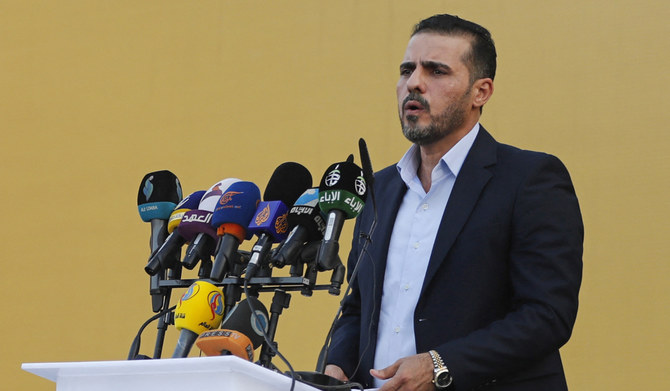
- “We also haven’t seen the necessary seriousness from the Iraqi government to remove them,” the spokesman, Abu Ali Al-Askari, added in a statement
BAGHDAD: Iraq’s powerful Kataeb Hezbollah on Tuesday renewed its call for US troops to withdraw from Iraq, months after the Iran-backed armed group suspended attacks against American forces.
Washington and Baghdad have been engaged in talks over the presence of US troops in Iraq, who are stationed there as part of an international anti-jihadist coalition.
A spokesman for Kataeb Hezbollah said in a statement that the group “did not perceive the American enemy’s seriousness in withdrawing the troops and dismantling its spy bases in Iraq.”
“We also haven’t seen the necessary seriousness from the Iraqi government to remove them,” the spokesman, Abu Ali Al-Askari, added in a statement.
The United States considers Kataeb Hezbollah a “terrorist” group and has repeatedly targeted its operations in recent strikes.
During more than three months, as regional tensions soared over the devastating Israel-Hamas war in Gaza, US troops were targeted more than 165 times in the Middle East, mainly in Iraq and neighboring Syria.
The Islamic Resistance of Iraq, a loose alliance of Iran-backed groups including Kataeb Hezbollah, had claimed the majority of the attacks.
But a deadly drone attack in late January triggered retaliation, with US forces launching dozens of strikes against Tehran-backed groups, including Kataeb Hezbollah.
Three US personnel were killed in the January 28 drone strike in Jordan, near the Syrian border.
Two days later, Kataeb Hezbollah said it was suspending its attacks on US forces.
In February the United States and Iraq resumed talks on the future of the US-led coalition’s presence in Iraq, following a request by Iraqi Prime Minister Mohamed Shia Al-Sudani who has been calling for an end to the coalition’s mission.
The United States has some 2,500 troops in Iraq and 900 in Syria as part of the international coalition against the Islamic State (IS) group.
The coalition was deployed to Iraq at the government’s request in 2014 to help combat IS, which had taken over vast swathes of Iraq and neighboring Syria.
US completes construction of Gaza aid pier

WASHINGTON: The US military has completed construction of its Gaza aid pier, but weather conditions mean it is currently unsafe to move the two-part facility into place, the Pentagon said Tuesday.
The pier — which the US military started building last month and which will cost at least $320 million — is aimed at boosting deliveries of desperately needed humanitarian assistance to Gaza, which has been ravaged by seven months of Israeli operations against Hamas.
“As of today, the construction of the two portions of the JLOTS — the floating pier and the Trident pier — are complete and awaiting final movement offshore,” Deputy Pentagon Press Secretary Sabrina Singh told journalists, using an acronym for Joint Logistics Over-the-Shore, the official name for the pier capability.
“Today there are still forecasted high winds and high sea swells, which are causing unsafe conditions for the JLOTS components to be moved. So the pier sections and military vessels involved in its construction are still positioned at the port of Ashdod,” in Israel, Singh said.
US Central Command (CENTCOM) “stands by to move the pier into position in the near future,” she added.
The vessels and the under-construction pier were moved to the port due to bad weather last week. Once the weather clears, the pier will be anchored to the Gaza shore by Israeli soldiers, keeping US troops off the ground.
Aid will then be transported via commercial vessels to a floating platform off the Gaza coast, where it will be transferred to smaller vessels, brought to the pier, and taken to land by truck for distribution.
Plans for the pier were first announced by US President Joe Biden in early March as Israel held up deliveries of assistance by ground, and US Army troops and vessels soon set out on a lengthy trip to the Mediterranean to build the pier.
Some two months later, the humanitarian situation in Gaza remains dire. The United Nations said Tuesday that Israel had denied it access to the Rafah crossing — the key entry point for aid into the besieged territory.
The White House said the closing of Rafah and the other main crossing, Karem Shalom, was “unacceptable” and needed to be reversed.
In addition to seeking to establish a maritime corridor for aid shipments, the United States has also been delivering assistance via the air.
CENTCOM said American C-130 cargo planes dropped more than 25,000 Meal Ready To Eat military rations into Gaza on Tuesday in a joint operation that also delivered the equivalent of more than 13,000 meals of Jordanian food supplies.
“To date the US has dropped 1,200 tons of humanitarian assistance,” CENTCOM said in a statement.
Gaza’s bloodiest-ever war broke out following Hamas’s unprecedented October 7 attack on Israel, which resulted in the deaths of more than 1,170 people, mostly civilians, according to an AFP tally of Israeli official figures.
Israel’s retaliatory offensive has killed at least 34,789 people in Gaza, mostly women and children, according to the Hamas-run territory’s health ministry.
Kuwait, Turkiye sign agreements during emir’s state visit
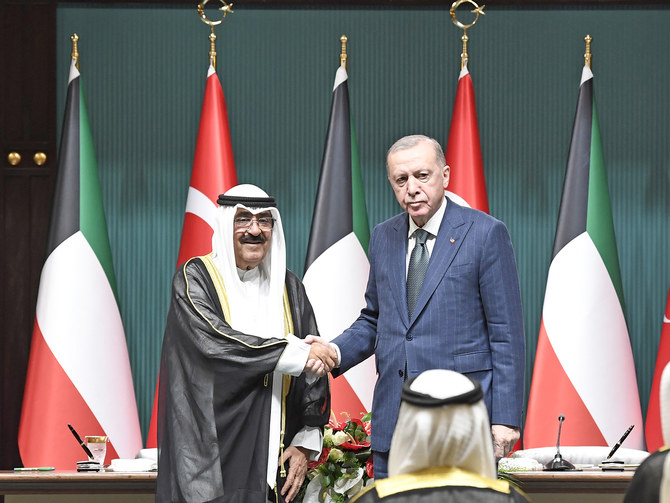
- Several cooperation deals inked at the Presidential Palace in Ankara
LONDON: Kuwait’s Emir Sheikh Meshal Al-Ahmed Al-Jaber Al-Sabah held talks on Tuesday with Turkish President Recep Tayyip Erdogan on a range of regional and international issues during his official visit to Ankara.
The two parties “expressed a common desire to bolster cooperation and coordination in many fields,” in particular trade and investment, and the emir said the two countries had the potential to boost trade exchange and investment opportunities, the Kuwait News Agency reported.
He went on to praise the “historic relations between our countries for the past 60 years, since their establishment in 1964,” and added “we express our aspirations toward promoting these relations to honor the aspirations of our peoples.”
Sheikh Meshal, who had arrived in the Turkish capital earlier on Tuesday, also praised Turkiye’s “honorable” support for Kuwait during Iraq’s invasion in 1990.
The Kuwaiti emir welcomed the start of negotiations for a free trade agreement between the GCC (Gulf Cooperation Council) and Turkiye, which commenced following the signing of a joint statement on April 21.
He added: “We affirm our aspiration for strengthening joint cooperation in all fields, especially in the defense domain through government-to-government contracting.”
The two leaders witnessed the signing of several cooperation agreements at the Presidential Palace in Ankara, including an executive protocol between the Kuwaiti and Turkish defense ministries.
The countries’ foreign ministries signed a memorandum of understanding to establish a strategic dialogue, while the Kuwaiti Civil Defense and the Turkish Ministry of Interior Disaster and Emergency Management Authority also signed a memorandum.
Letters of intent were signed between the Kuwait Direct Investment Promotion Authority and the Turkish General Authority for Free Zones in the Ministry of Trade on cooperation in the free zones field, and between the Kuwaiti Ministry of State for Housing Affairs and the Turkish Ministry of Environment, Urbanization and Climate Change on cooperation in housing and infrastructure.
The Kuwait Investment Authority and the Turkish Presidency Investment Office signed a memorandum regarding cooperation on investment promotion.
Erdogan awarded Sheikh Meshal with the State Order “to reflect deep-rooted ties between the two friendly countries,” KUNA said.
The emir also paid a visit to the Ataturk Mausoleum in Ankara during the visit.
Jordan’s Queen Rania highlights effects of war in Gaza on the world

- She tells Milken Institute Global Conference 2024 in Los Angeles the conflict has ‘divided people along new battle lines’ and fueled a growing sense polarization among peoples
- ‘The only way we can achieve security in our part of the world is through a negotiated peace, where Palestinians have not a promise of statehood, but actual statehood,’ she says
LONDON: Jordan’s Queen Rania on Tuesday discussed the global effects of Israel’s war on Gaza and called for a just solution to the wider Israeli-Palestinian conflict.
Speaking during a session at the Milken Institute Global Conference 2024 in Los Angeles on Monday, she said the war has “exposed old fractures” and “divided people along new battle lines,” which has contributed to a growing global polarization.
“Polarization leads to binary thinking; it makes us think of our world as us versus them, left versus right, East versus West,” she added. “And even though that might give us a false sense of security that we belong in a certain camp, it actually inadvertently really puts constraints on us because it kind of limits the way we think, what we should do, what we should say and, more importantly, it makes us look at everybody outside our camp as the rival, as the enemy.
“Peace cannot be achieved through violence … it has to be achieved through negotiations, political process, evenhandedness and commitment (and) the only way that we can achieve security in our part of the world is through a negotiated peace, where Palestinians have not a promise of statehood, but actual statehood.
“It all comes back down to an illegal occupation. You want safety and security, we need to end the occupation, because you cannot have a safe and secure Israel while there is a grave injustice on their border.”
Queen Rania highlighted the divisions and sense of “selective empathy” that exist in relation to the Israeli-Palestinian conflict and said people increasingly feel forced to choose sides, causing the “middle ground to shrink year after year.”
She told delegates: “When it comes to the Palestinians, I think they’ve been pushed to the periphery, where their suffering has become almost unnoticed, and where they become almost a people unto whom anything can happen without consequence.
“That’s why it’s important for us to actually find that middle ground. People should put people first. What Palestinians want is not sympathy or special treatment; they just want the impartial application of the law.”
Queen Rania also spoke about the number of civilian deaths during the war in Gaza, which began after the Oct. 7 attacks by Hamas on Israel, and noted that it has claimed the lives of more doctors, aid workers and journalists than any other conflict, as well as 14,500 children.
Regardless of whether Israel’s actions during the conflict can officially be categorized as genocide or not, many people are dying and the very fact that people are even discussing whether such a designation is justified was “shocking” enough in itself, she said.
The world expressed its collective anger over the Hamas attacks on Israel on Oct. 7, she added, so why, she asked, do the mass deaths in Gaza not warrant the same response?
“You have to give human life equal value and you have to place equal condemnation on human rights violations,” said the queen. “You cannot have credibility without moral consistency.”
The US has a very important role to play in the war because it is the single most powerful country in terms of its leverage on Israel, she said, and so much depends on how willing Washington is to use its “political capital” to hold Israeli authorities accountable for their actions.
“The starting point needs to be a legal framework that is recognized by the international community, and then a commitment from the US to hold Israel accountable when it doesn’t stick to the terms, of course,” said Queen Rania.
She added that there is a need for Israelis and Palestinians to “start to heal the wounds and to try to build the trust that has been lost now as a result of years of suffering, and we have a responsibility to try to stand behind a vision that delivers the people there the security and the future they deserve.”
The theme for the 27th annual Milken Institute Global Conference, which began on Sunday and concludes on Wednesday, is “Shaping a Shared Future.” Specific topics of discussion on the agenda include geopolitical hot spots, the climate crisis, and the rise of artificial intelligence.
UN atomic chief urges Iran to take ‘concrete’ steps for cooperation
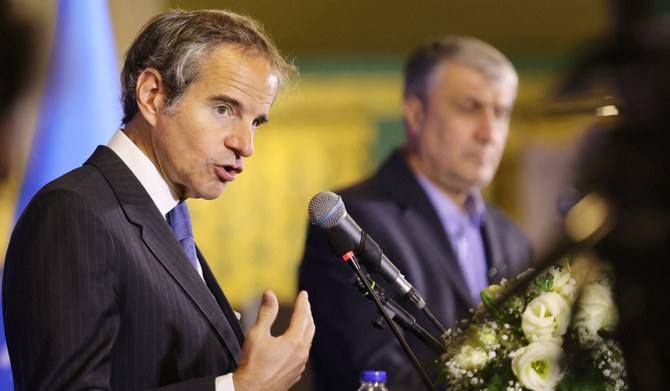
- Grossi said a March 2023 deal with Iran was “still valid” but required more “substance”
ISFAHAN: UN atomic watchdog chief Rafael Grossi, visiting Iran on Tuesday, urged the country to adopt “concrete” measures to bolster cooperation on its nuclear program and address the international community’s concerns.
At a news conference in the city of Isfahan, Grossi said he had proposed in talks with Iranian officials that they “focus on the very concrete, very practical and tangible measures that can be implemented in order to accelerate” cooperation.
The International Atomic Energy Agency director-general held talks with senior Iranian officials including Atomic Energy Organization’s head Mohammad Eslami.
Grossi insisted on the need to “settle differences” on the nuclear issue while the Middle East was going through “difficult times,” particularly with the war between Israel and the Iran-backed Palestinian militant group Hamas in the Gaza Strip.
“Sometimes, political conditions pose obstacles to full-fledged cooperation” between Iran and the international community, he said.
To overcome these obstacles, he said, “we need to come up with concrete steps that are going to be helpful in bringing us closer to these solutions that we all need.”
Grossi said a March 2023 deal with Iran was “still valid” but required more “substance.”
The agreement was reached during Grossi’s last visit to Iran and outlined basic cooperation measures including on safeguards and monitoring. The IAEA chief said, however, that there had been a “slowdown” in the agreement’s implementation including the number of inspections being reduced and the accreditation of a group of IAEA experts being withdrawn by Iran.
Iran suspended its compliance with caps on nuclear activities set by a landmark 2015 deal with major powers a year after the US in 2018 unilaterally withdrew from the agreement and reimposed sweeping sanctions.
“We have this legal right to reduce our commitments when the other parties do not adhere to their obligations,” Eslami said during the joint news conference.
Tensions between Iran and the IAEA have repeatedly flared since the deal fell apart, and EU-mediated efforts have so far failed both to bring Washington back on board and to get Tehran to again comply with the terms of the accord.
The agency has in recent months criticized Iran for a lack of cooperation on issues including the expansion of its nuclear work, the barring of inspectors and deactivating the agency’s monitoring devices at its nuclear facilities.



